Tsai Ing-wen: A Legal Eagle Soars to Become Taiwan’s First Female President
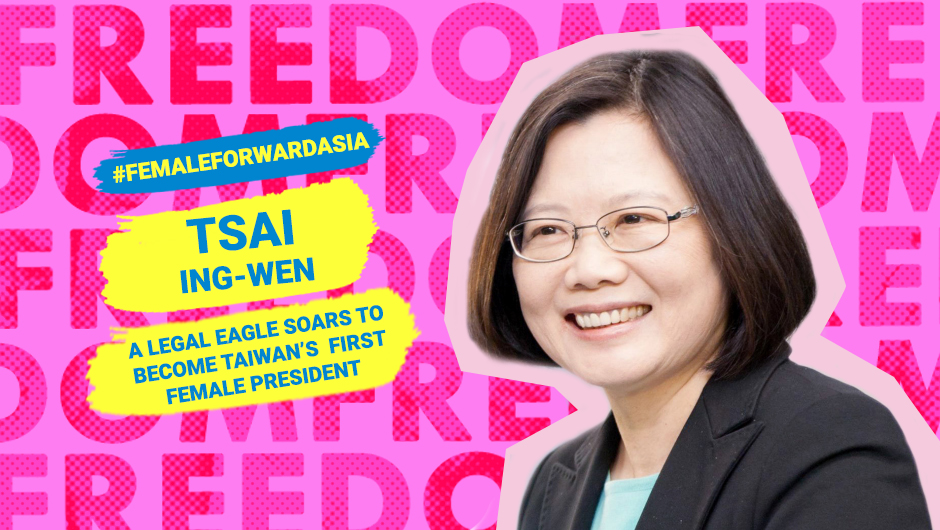
China has always been wary of the Democratic Progressive Party (DPP) and this intensifies every time it becomes the party in power in what it considers its renegade province.
The Chinese communist government was particularly displeased, to say the least, with a phone call on 2 December 2016 between Taiwanese President Tsai Ing-wen and President- elect, Donald Trump. The 10-minute conversation stirred a hornet’s nest across the Pacific. China’s Ministry of Foreign Affairs released a statement opposing any official contact between the US and Taiwan, and even sought clarification from the outgoing Obama administration though the White House did not reveal any detail (Samuelson, 2016).
President Tsai herself, in characteristic fashion, tried to calm the situation. “I do not foresee major policy shifts in the near future because we all see the value of stability in the region,” she added, according to The Washington Post (Samuelson, 2016).
It was the first direct conversation between the presidents of Taiwan and the United States since 1979, when diplomatic relations between China and the US was formally restored. But then again, Tsai Ing-wen is a person of many firsts—the first woman president of Taiwan, the first president of Hakka or aboriginal descent, the first female presidential candidate of Taiwan, the first to become president without any prior elected office, and the first Taiwanese president to travel to the United States accompanied by Taiwanese journalists.
She recently landed in mainland United States, again to the dismay of China which protested before, during and after her short visits to Los Angeles (on her way to Paraguay and Belize) and Houston, on her way back.
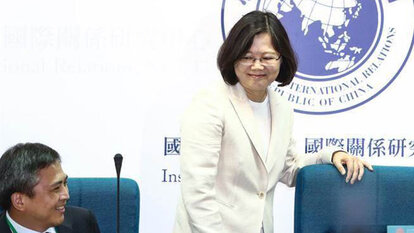
In Los Angeles, she met with three California lawmakers, including Democrat Brad Sherman, who called on his government to formally invite Tsai to Washington, which would break decades of American foreign policy (Horton, 2018). Sherman, a ranking member of the House Foreign Affairs Subcommittee on Asia and the Pacific who describes himself as a strong advocate of US-Taiwan alliance, stated, “There may be a time when the president of Taiwan addresses to the joint session of congress, but I think that will be in the next decade. It will begin not with the presidential visit but perhaps at the foreign ministerial level” (Lee, 2018). She delivered a lecture at the Ronald Reagan Presidential Library and, as another first, she visited the Taiwan’s de facto consulate (Horton, 2018).

Quoting President Reagan, Tsai said “everything was negotiable except two things: our freedom and our future,” but stressed that “we will keep our pledge that we are willing to jointly promote regional stability and peace under the principles of national interests, freedom and democracy” (Lee, 2018).
Tsai spent sixteen years of her life as an academic and a few years in government as a technocrat. She only joined the DPP in 2004. Yet her acumen in realpolitik and her charismatic touch with the public will put to shame traditional politicians who have spent most of their adult lives in politics and campaign elections.
But aside from making inroads in politics and diplomacy, Tsai’s achievements can be measured by Taiwan’s recent economic successes.
As Ko Shu-ling (2018) of Kyodo News observed, Tsai ended her second year in office with a very strong economy. Ko Shu-ling (2018) cited Taiwan’s growth of 2.86 percent in 2017, which was the highest in three years; a new low of 3.63 percent unemployment rate; and the local bourse hitting 10,000 points for 12 consecutive months. Looking ahead, she proposed investments in biomedical and clean-energy technologies with the goal of a nuclear free Taiwan by 2025 as well as initiatives to encourage population growth and immigration, especially of skilled workers (Shu-Ling, 2018).
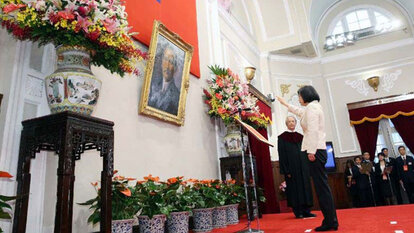
The New Southbound Policy (NSP) is a centerpiece of the Tsai presidency. It seeks to further enhance and expand regional social and economic cooperation with Southeast and South Asian countries, Australia and New Zealand. According to the Ministry of Foreign Affairs, “the policy ranges from loosening visa restrictions to providing a more suitable environment for businesses looking to expand” (Shu-Ling, 2018).
The Diplomat, which observed geo-political trends throughout the Asia-Pacific, noted that “Taiwan (seeks to) form meaningful relationships with countries in the Indo-Pacific that are predicated on arenas in which Taipei has a comparative advantage over Beijing, ultimately aiming to foster and preserve favorable geopolitical relationships at a time when China appears to be ever-expanding and increasingly bellicose” (Ministry of Foreign Affairs, 2017).
Brookings Institute noted that Tsai herself said that the primary goal of NSP is to “bid farewell to our past overreliance on a single market” and that “the New South bound Policy is our new ‘Regional Strategy for Asia’. Under this policy, we intend to work with countries in the region and around the world to deepen and broaden our presence in South and Southeast Asia” (Ministry of Foreign Affairs, 2017). The said institute keenly observed:
Aside from reducing economic dependency on mainland China... the second driver of NSP (is) ‘to hold a more advantageous position in international society.’ Professor Joyce Lin, Director of the ASEAN Studies Centre at Tamkang University, interprets this as striving to ‘increase [Taiwan’s] international space,’ or room for strategic maneuverability. But because China has a consistent record of trying to block Taiwan’s efforts to expand its international role, in addition to reducing the number of its diplomatic partners, Taiwan must be skillful in identifying and filling non-traditional economic and diplomatic niches. The NSP is a prime example of such an effort” (Ministry of Foreign Affairs, 2017).
Tsai is walking the tight rope with very little space to maneuver in creating these non-traditional economic and diplomatic niches. But diplomacy is one her strengths. After all, while “working under the then-ruling Kuomintang (KMT), she served as a key trade negotiator involved in Taiwan’s entry into the World Trade Organization” (Hong, 2018).
But she is stern when speaking of Chinese aggression and warning other countries that they too can be subjected to its expansionist agenda. “This is not just Taiwan’s challenge, it is a challenge for the region and the world as a whole, because today it’s Taiwan, but tomorrow it may be any other country that will have to face the expansion of China’s influence. Their democracy, freedom, and freedom to do business will one day be affected by China. We need to work together to reaffirm our values of democracy and freedom in order to constrain China and also minimise the expansion of their hegemonic influence,” Tsai told Agence France Press (AFP) (Hunter Marston, 2018).
Such fiery words from someone soft spoken and as the youngest of nine children, she was not even expected to have a professional career, much less enter politics and be president of her country.
She was born in a coastal village, the child of a Hakka (an indigenous tribe in Taiwan) father and a Taiwanese mother. She spent her leisure time taking care of her father who run a successful automotive maintenance business.
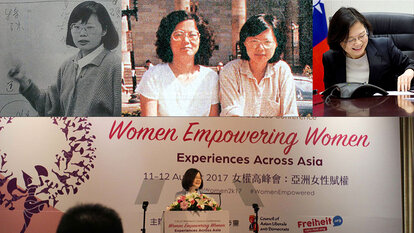
She moved to Taipei at age 11 and by the time she was 24, she finished law at her country’s top institution of higher learning, the National University of Taiwan, one of the top-ranked in the world. In 1980 and 1984, she would earn her masters and doctorate degrees, respectively, from leading universities in the United States and the United Kingdom-- Cornell University, and the London School of Economics and Political Science. Armed with impres- sive academic credentials with a solid track record in three continents, she became a professor of law from 1984 to 2000. Her career as an academic is the longest she had.
She is a dynamic and reformist leader. And this is evident when she became the leader of DPP even prior to her election as Taiwan’s president. She believes “in a more sophisticated DPP” given the complexities of the global economy and politics, particularly cross-straits relations.
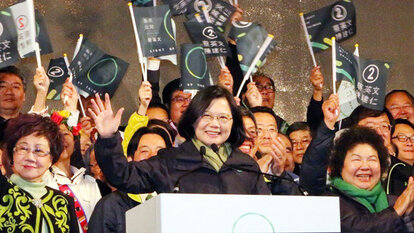
For centuries, politics is discussed in cafes. Revolutions and independence move- ments have been conceived in coffee shops. But in this particular case, a cafe—and its entire chain—became the very center of a political war, as reported by The Independent (Horton, 2018):
Shortly after she visited a Los Angeles location of the Taiwanese coffee chain 85C, the Chinese internet erupted with anger, calling for a boycott of the chain’s several hundred locations in China, its largest market. That day, 85C’s parent company, Gourmet Master, whose stock trades on Taiwan’s exchange, lost $120 million in share value. The company promptly apologised and expressed support for peaceful unification.
Many Taiwanese were upset by the company caving in to Chinese pressure, with some also calling for a boycott of the chain. Polls consistently show that the overwhelming majority of people in Taiwan, a multiparty democracy, oppose being absorbed into China’s one-party, authoritarian rule. The episode is the latest example of the Chinese government using its grip on the country’s enormous market to pressure corporations into serving its political agenda” (Horton, 2018).
Paraphrasing a line from the lyrics of a song by Sting, China watches every step that Tsai makes. And like the smartest girl in school, she deals with the class bully by being nonprovocative but stern and with intelligence, maturity and some cunning. With her astute legal and scholarly mind, tempered by intuition and street-smart audacity, she reached the pinnacle at a relative short time, and without bloodshed.
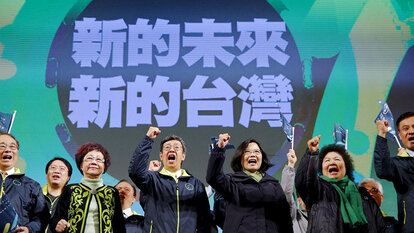
On the other hand, Taiwan’s first non-KMT president and vice-president, Chen Shui-bin and Anette Lu, experienced first-hand the brutality of Martial Law including imprisonment and assassination attempts.
But despite Taiwan’s dark past, it has long emerged as a vibrant democracy with a prosperous economy. Taiwan is a small country in terms of territory and population. Yet, it is the seventh biggest economy in Asia and is ranked as the 15th most competitive nation in the world. Taiwan’s success is the best argument against the principle of Asian values which was and continues to be favorably espoused by authoritarian leaders including Taiwan’s past presidents.
The ascent of a non-traditional politician who does not come from any political dynasty and who made her early mark as an academician and technocrat is a testimony to the political maturity of Taiwanese people and their adherence to good governance and democracy. And her selection by DPP to be its leader and later presidential standard bearer is a living proof that DPP is a model for internal democracy and principled politics.
There is a need to be both strategically effective and morally acceptable, to strike a balance between pragmatism and principles. President Tsai demonstrates an important lesson—nice guys don’t always finish last and in fact, they can finish first. But in this case, the highest nice guys can aim for is the second place—and, that is not necessarily a bad thing.
References
Hong, C.-S. a. (2018, June 28). Taiwan’s New Southbound Policy Meets the US Free and Open Indo- Pacific Strategy. Retrieved from The Diplomat: https://thediplomat.com/2018/06/taiwans-new-southbound-policy-meets-the…
Horton, C. (2018, August 20). China enraged as Taiwan president’s US visit shows growing support in Congress. Retrieved from The Independent: https://www.independent.co.uk/news/world/asia/taiwan-us-china-president…
Hunter Marston, R. C. (2018, July 30). Taiwan’s engagement with Southeast Asia is making progress under the New Southbound Policy. Retrieved from Brookings: https://www.brookings.edu/opinions/taiwans-engagement-with-southeast-as…
Lee, Y. (2018, August 14). Warming US-Taiwan Ties on Display as President Tsai Visits LA. Retrieved from Voice of America: https://www.voanews.com/a/warming-us-taiwan-ties-on-display-as-presiden…
Ministry of Foreign Affairs. (2017, February 28). New Southbound Policy: an Introduction (2017.02.28). Retrieved from New Southbound Policy Portal`: https://nspp.mofa.gov.tw/nsppe/news.php?post=112894&unit=376
Samuelson, K. (2016, December 6). Taiwan’s President Says Donald Trump Phone Call ‘Does Not Indicate a Policy Shift’. Retrieved from TIME: http://time.com/4591779/taiwan-president-trump-phone-call/
Shu-Ling, K. (2018, May 20). Taiwan president Tsai Ing-wen ends second year in office with strong economy, but low poll numbers. Retrieved from The Japan Times: https://www.japantimes.co.jp/news/2018/05/20/asia-pacific/politics-dipl…
_______________________
First published on the book, Compelled by Duty, Conscripted by Destiny: Portraits of 16 Asian Women at the Frontline of Democratic Struggle, authored by John Joseph S. Coronel.
In cooperation with the Council of Asian Liberals and Democrats (www.cald.org)